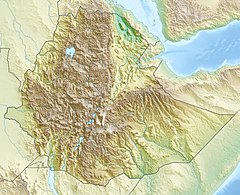Qarano River
| Qarano | |
|---|---|
 The Qarano River at Mitslal Afras | |
Qarano River in Dogu’a Tembien | |
| Location | |
| Country | Ethiopia |
| Region | Tigray Region |
| District (woreda) | Dogu’a Tembien |
| Physical characteristics | |
| Source | Addilal |
| • elevation | 2,246 m (7,369 ft) |
| Mouth | Giba River |
• location | May Qarano in Emni Ankelalu municipality |
• coordinates | 13°36′34″N 39°23′10″E / 13.6094°N 39.3861°E |
• elevation | 1,753 m (5,751 ft) |
| Length | 15.2 km (9.4 mi) |
| Width | |
| • average | 7 m (23 ft) |
| Basin features | |
| River system | Seasonal river |
| Landmarks | Tufa dam at outlet |
| Waterfalls | Near outlet |
| Topography | Undulating, with minor cliffs |
The Qarano is a river of the Nile basin. Rising in the mountains of Dogu’a Tembien in northern Ethiopia, it flows eastward to empty in the Giba and Tekezé River. [citation needed]

Characteristics[edit]
The Qarano is a confined ephemeral river, locally meandering in its narrow alluvial plain, with an average slope gradient of 45 metres per kilometre. With its tributaries, the river has cut a deep gorge.[1]
Flash floods and flood buffering[edit]

Runoff mostly occurs in the form of high runoff discharge events that occur in a very short period (called flash floods). These are related to the steep topography, often little vegetation cover and intense convective rainfall. The peaks of such flash floods have often a 50 to 100 times larger discharge than the preceding baseflow.[1] The magnitude of floods in this river has however been decreased due to interventions in the catchment.
At Addilal and on other steep slopes, exclosures have been established; the dense vegetation largely contributes to enhanced infiltration, less flooding and better baseflow.[2] Physical conservation structures such as stone bunds[3][4] and check dams intercept runoff.[5][6]
Boulders and pebbles in the river bed[edit]
Boulders and pebbles encountered in the Qarano river bed can originate from any location higher up in the catchment, and are either made of Antalo Limestone[7] or freshwater tufa[8]
Natural boundary[edit]
During its course, this river passes through three municipalities and constitutes different borders.[9] On the various parts:
- Addilal at the north
- Emni Ankelalu at the east
- Addi Azmera at the west and southwest
Trekking along the river[edit]
Trekking routes have been established across and along this river.[10] The tracks are not marked on the ground but can be followed using downloaded .GPX files.[11]
- Trek 23, along the upper part of the river
In the rainy season, flash floods may occur and it is advised not to follow the river bed. [12]
See also[edit]
References[edit]
- ^ a b Amanuel Zenebe, and colleagues (2019). The Giba, Tanqwa and Tsaliet rivers in the headwaters of the Tekezze basin. In: Geo-trekking in Ethiopia's Tropical Mountains - The Dogu'a Tembien District. SpringerNature. doi:10.1007/978-3-030-04955-3_14. ISBN 978-3-030-04954-6.
- ^ Descheemaeker, K. and colleagues (2006). "Runoff on slopes with restoring vegetation: A case study from the Tigray highlands, Ethiopia". Journal of Hydrology. 331 (1–2): 219–241. doi:10.1016/j.still.2006.07.011. hdl:1854/LU-378900.
- ^ Nyssen, Jan; Poesen, Jean; Gebremichael, Desta; Vancampenhout, Karen; d'Aes, Margo; Yihdego, Gebremedhin; Govers, Gerard; Leirs, Herwig; Moeyersons, Jan; Naudts, Jozef; Haregeweyn, Nigussie; Haile, Mitiku; Deckers, Jozef (2007). "Interdisciplinary on-site evaluation of stone bunds to control soil erosion on cropland in Northern Ethiopia". Soil and Tillage Research. 94 (1): 151–163. doi:10.1016/j.still.2006.07.011. hdl:1854/LU-378900.
- ^ Gebeyehu Taye and colleagues (2015). "Evolution of the effectiveness of stone bunds and trenches in reducing runoff and soil loss in the semi-arid Ethiopian highlands". Zeitschrift für Geomorphologie. 59 (4): 477–493. Bibcode:2015ZGm....59..477T. doi:10.1127/zfg/2015/0166.
- ^ Nyssen, J.; Veyret-Picot, M.; Poesen, J.; Moeyersons, J.; Haile, Mitiku; Deckers, J.; Govers, G. (2004). "The effectiveness of loose rock check dams for gully control in Tigray, Northern Ethiopia". Soil Use and Management. 20: 55–64. doi:10.1111/j.1475-2743.2004.tb00337.x.
- ^ Etefa Guyassa and colleagues (2017). "Effects of check dams on runoff characteristics along gully reaches, the case of Northern Ethiopia". Journal of Hydrology. 545 (1): 299–309. Bibcode:2017JHyd..545..299G. doi:10.1016/j.jhydrol.2016.12.019. hdl:1854/LU-8518957.
- ^ Sembroni, A.; Molin, P.; Dramis, F. (2019). Regional geology of the Dogu'a Tembien massif. In: Geo-trekking in Ethiopia's Tropical Mountains — The Dogu'a Tembien District. SpringerNature. ISBN 978-3-030-04954-6.
- ^ Moeyersons, J. and colleagues (2006). "Age and backfill/overfill stratigraphy of two tufa dams, Tigray Highlands, Ethiopia: Evidence for Late Pleistocene and Holocene wet conditions". Palaeogeography, Palaeoclimatology, Palaeoecology. 230 (1–2): 162–178. Bibcode:2006PPP...230..165M. doi:10.1016/j.palaeo.2005.07.013.
- ^ Jacob, M. and colleagues (2019). Geo-trekking map of Dogu'a Tembien (1:50,000). In: Geo-trekking in Ethiopia's Tropical Mountains - The Dogu'a Tembien District. SpringerNature. ISBN 978-3-030-04954-6.
- ^ Description of trekking routes in Dogu'a Tembien. In: Geo-trekking in Ethiopia's Tropical Mountains - The Dogu'a Tembien District. GeoGuide. SpringerNature. 2019. doi:10.1007/978-3-030-04955-3. ISBN 978-3-030-04954-6. S2CID 199294303.
- ^ "Public GPS Traces tagged with nyssen-jacob-frankl".
- ^ Nyssen, Jan (2019). "Logistics for the Trekker in a Rural Mountain District of Northern Ethiopia". Geo-trekking in Ethiopia's Tropical Mountains. GeoGuide. Springer-Nature. pp. 537–556. doi:10.1007/978-3-030-04955-3_37. ISBN 978-3-030-04954-6.


 French
French Deutsch
Deutsch